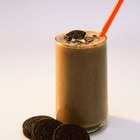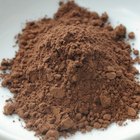
If you have ever thrown a coat over your pajamas and driven across town in quest of chocolate, or at least considered doing so, you understand how powerful the craving for this tasty bean can be. While some claim the stuff is addictive, your craving could be driven by a more primal need to satisfy a nutritional deficiency.
Food Cravings and Nutritional Deficiency
The powerful need for chocolate has been recognized by the scientific community to be based on the cocoa bean's unique properties. According to the folks at Yale-New Haven Hospital, phenylethylamine found in chocolate gives us a feeling similar to falling in love. The substance anadamide stimulates brain receptors in the same way as other addictive substances. The European Food Information Council explains that a diet that restricts certain nutrients can stimulate a desire, making the food more salient. However, the EFIC also recognizes that food cravings have an emotional component, noting that some foods like chocolate just make us feel better.
Nutritional Value of Chocolate
Chocolate is a rich source of a number of vitamins and minerals, which could partially explain strong cravings. The vitamins A, B-1, B-2, B-3, C, E and pantothenic acid and the minerals magnesium, calcium, iron, zinc, copper, potassium and manganese all play important roles in vital metabolic functions. Magnesium in particular is known to alleviate symptoms associated with premenstrual syndrome. The Yale-New Haven Hospital notes that the darker the chocolate, the more health benefits it provides, due to a higher concentration of cocoa butter.
Antioxidants and Other Properties
Cocoa beans contain polyphenols known as flavinoids, the same as those found in red wine that have antioxidant properties which reduce the risk of stroke and heart attack due to blood clots. Cocoa also inhibits LDL cholesterol, the "bad" cholesterol, from building up on arterial walls. Chocolate is a potent mood elevator, increasing serotonine levels in the brain. Chocolate contains the stimulants phenylethylamine and caffeine, and theobromine, known to be toxic to dogs, cats and other pets.
Chocolate and Weight Control
While many dieters and weight-conscious individuals steer clear of chocolate, a 2008 study conducted by the Faculty of Life Sciences at the University of Copenhagen found dark chocolate to be effective in diminishing cravings for sweet, salty and fatty foods. The subjects, healthy young men of normal weight, were divided into two groups and given either milk or dark chocolate of equal calories. The men, who had been fasting for 12 hours prior to the study, were asked to journal every half hour for the following five hours, making note of hunger, food cravings and satiety. They were then given pizza and told to eat until they felt satisfied. The dark chocolate group ate 15 percent less than the milk chocolate group, and reported less desire for sweet, salty or fatty foods.
Related Articles

How Does Chocolate Affect the Nervous ...

The Antioxidant Levels of Cacao

Stimulants in Chocolate That Are not ...

FDA Standards of Chocolate Identity

Chocolate and Vitamins

Which Country Produces the Most ...

Bad Effects of Chocolate

Skin Benefits of Eating Coconut Oil

What Are the Benefits of Chocolate ...

How Many Types of Chocolate Are There?

The History of Caramel Candy

Number of Calories in Dark ...

Chocolate Milk and Weight Loss

Nutritional Facts of Pure Cocoa

What Foods Provide Calcium D-Glucarate?

Nutrition Information For a 16-Ounce ...

Which Vegetables Produce the Most ...

Foods Containing Theobromine

Strawberries & Acne

Swiss Chocolate Facts
References
Writer Bio
Michelle Matte is an accomplished fitness professional who holds certifications in personal training, pilates, yoga, group exercise and senior fitness. She has developed curricula for personal trainers and group exercise instructors for an international education provider. In her spare time, Matte writes fiction and blogs.
Photo Credits
Jupiterimages/Photos.com/Getty Images